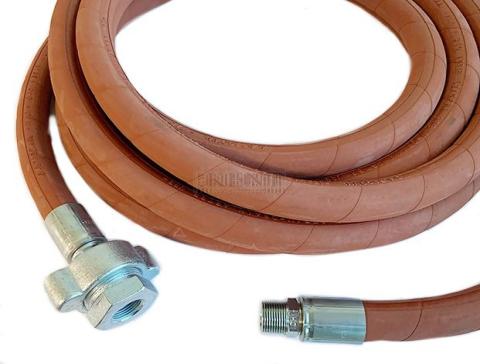API hoses, which comply with the specifications of the American Petroleum Institute (API), are commonly used in the petrochemical industry, and their durability and safety are crucial. Proper daily maintenance can extend the service life of API hoses, reduce downtime, and ensure operational safety. Here are suggestions on how to perform daily maintenance of API hoses:
Cleaning and inspection
Regular cleaning
Cleaning hoses is a basic and important maintenance step. After use, the oil stains, dirt, and other impurities inside and outside the hose should be removed. Specialized cleaning agents can be used for cleaning, but it must be ensured that these cleaning agents do not cause damage to the hose material. For example, some highly corrosive cleaning agents may corrode the outer layer of the hose, shortening its service life.
Appearance inspection
After each use, a visual inspection should be conducted to look for any cracks, flat wear, or swelling. These may be signs of potential faults, and damaged hoses need to be replaced in a timely manner to prevent accidents from occurring. In addition, check for loose or leaking hose connections, as these issues may cause fluid leakage when transported under high pressure.
Internal inspection
Regularly conduct internal inspections to confirm that the inner wall of the hose is not blocked or corroded. This can be accomplished by inserting specialized detection equipment, such as an endoscope, to examine the condition inside the hose. If severe corrosion or blockage is found, the hose should be replaced partially or completely in a timely manner to avoid malfunctions during transportation.
Storage and replacement
Proper storage
When not in use, API hoses should be stored in a dry, cool, and well ventilated place, avoiding direct sunlight and extreme temperatures, as high temperatures can accelerate rubber aging, while low temperatures may make the material brittle. In addition, the hose should be kept loose during storage to avoid prolonged bending or stretching, as this may cause damage to the internal structure.
Avoid mechanical damage
During storage and use, it should be ensured that the hose is not crushed by sharp objects or heavy equipment, which may cause damage to the outer wall. It is recommended to use specialized hooks or brackets to suspend hoses, reducing the risk of being stepped on or crushed. At the same time, the suspended hose should be moved regularly to avoid prolonged exposure to gravity in the same position, which may cause deformation.
Regular replacement
Even if there are no obvious signs of damage, API hoses should be replaced at regular intervals as material aging and fatigue may not be easily noticeable to the naked eye. Based on the manufacturer's recommendations and the usage environment and frequency of the hose, set a reasonable replacement cycle to ensure that the performance of the hose will not be reduced due to excessive aging.
Operation precautions
Follow the usage guidelines
Strictly follow the manufacturer's instructions and recommended operating parameters when using the hose, including pressure, temperature, and flow rate limitations. Exceeding these parameters may result in premature damage or failure of the hose. For example, hot fluid used beyond the design temperature range can cause overheating inside the hose, accelerating wear or rupture.
Train operators
Ensure that all personnel operating API hoses have received appropriate training on how to properly handle and maintain hoses. Educate operators to identify normal and abnormal operating conditions and emphasize the importance of reporting any abnormal situations, such as unexpected leaks, hose hardening or softening, etc.
Record maintenance history
Detailed records of the usage and maintenance history of each API hose, including usage duration, frequency of cleaning and inspection, known issues, and measures taken. These records not only help track the health status of hoses, but also serve as an important basis for optimizing maintenance plans and budgeting.
epilogue
By following the above suggestions, daily maintenance of API hoses can be effectively carried out, thereby extending their service life and ensuring the safe and efficient operation of petroleum and chemical facilities. The correct maintenance strategy is not only related to production efficiency, but also a key factor in ensuring the safety of the working environment.

